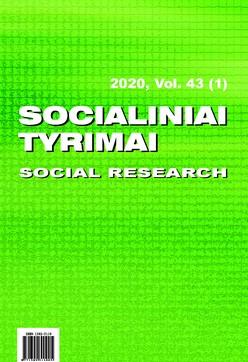Lyderystės raiškos besimokančioje organizacijoje galimybės
Opportunities for Leadership Expression in a Learning Organization
Author(s): Agnė Šneiderienė, Antanas Vaitiekus, Janina VaitiekienėSubject(s): Organizational Psychology, Behaviorism, Management and complex organizations
Published by: Vilniaus Universiteto Leidykla
Keywords: leadership; organization; learning organization;
Summary/Abstract: The creation and development of an information and knowledge-based society and knowledge economy are perceived as one of the most important priorities of social, economic, political development, culture, science and technological progress of modern society (Melnikas, Jakubavičius, Leichteris and Stumbrytė, 2017). It is important to create a learning society, a learning organization, a knowledge economy in order to adapt to the various challenges. Tortorella, Vergara, Garza-Reyes and Sahney (2020) noted that organizational learning can be seen as a process of improvement based on a clearer understanding and knowledge directly related to the organizational culture and environment. The scientific literature (Sakalas, 2012; Walker, 2014; Atkočiūnienė, 2014; Skrickienė, Čepuraitė and Štaras, 2018) presents various features of learning organization characteristics: strategy development, investment in one’s future, cooperation, environmental monitoring, focusing on problem identification and resolution, processing and applying large flows of information, responding, and anticipating internal and external changes. Organizational learning is a way of survival, capacity building, enabling it to change, that is to cope with change, and seize new opportunities. According to Walker (2014), knowledge, learning, and innovation are the key factors assuring the success of a modern organization. It should be noted that the acquisition, use and recognition of knowledge largely depend on the culture of the organization. As Salge and Vera (2012) argued, learning organizations understand the importance of learning and increase the ability to turn new knowledge into tangible improvements. In the scientific literature (Minelgaitė and Vaičiukynaitė, 2017; Katilienė, 2010; Vilkaitė-Vaitonė, Papšienė and Stulgienė, 2016; Digrienė, 2018; Shao, Feng and Hu, 2017; Walker, 2014) various definitions, styles and models of leadership have been identified. Usually, many definitions of leadership highlight one aspect in relation to other aspects (Minelgaitė and Vaičiukynaitė, 2017). Amor, Vázquez and Faíña (2020) noted that leadership is a critical component influencing an organization’s environment and how employees perceive their work. It should be noted that leadership theory is very diverse, but in the context of a learning organization, the types of transformational and transactional, empowering, positive, and collective leadership are important. It should be emphasized that the leader in the organization of the 21st century must be able to mobilize the organization’s staff for the implementation of strategic tasks; to be able rationally and effectively form a favourable environment for the learning organization. Managers and top managers must be guided by modern imperatives of a complex nature: the ideology of innovation, the perception of the need and necessity of change and reform, the application of best practices and experience of postmodern management in their organizational structures. Ewa, Cox, Tse and Lowe (2019) noted that there is a growing number of organizations that prosper and in which leadership is shared rather than concentrated in the hands of specific individuals or between these individuals. The importance of collective leadership will only increase as organizations involve more organizational, virtual, and non-traditional teams. Thus, there will be a need for a smoother and more dynamic process of empowering and consolidating leadership roles. Thus, it is very important to assess what are the opportunities for leadership expression in a learning organization. The object of research is the possibilities of leadership in a learning organization. The aim of the article is to form a model for determining the possibilities of leadership expression in a learning organization. To achieve the goal, the following tasks are formulated: 1. Analyse the definitions and features of a learning organization. 2. Examine the concept of leadership and analyse leadership styles. 3. Identify opportunities for leadership expression in a learning organization. 4. Form a model for determining the possibilities of leadership expression in a learning organization.
Journal: Socialiniai tyrimai
- Issue Year: 43/2020
- Issue No: 1
- Page Range: 45-57
- Page Count: 13
- Language: Lithuanian

